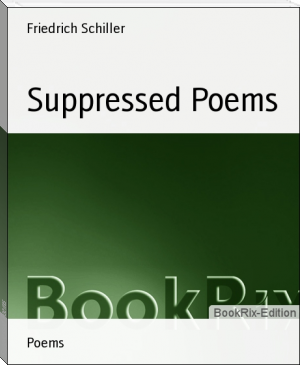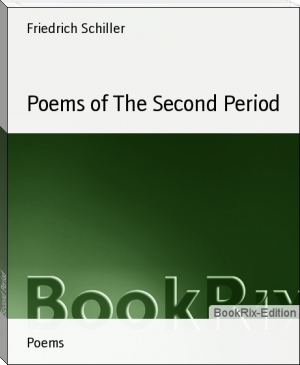Suppressed Poems by Friedrich Schiller (best black authors .txt) 📖

- Author: Friedrich Schiller
Book online «Suppressed Poems by Friedrich Schiller (best black authors .txt) 📖». Author Friedrich Schiller
When thou'rt buried 'neath dark Xanthus' wave?
HECTOR.
Dearest wife, go,--fetch my death-spear glancing,
Let me join the battle-dance entrancing,
For my shoulders bear the weight of Troy!
Heaven will be our Astyanax' protector!
Falling as his country's savior, Hector
Soon will greet thee in the realms of joy.
The following additional verse is found in Amalia's Song, as sung in The
Robbers, act iii. scene 1. It is introduced between the first and second
verses, as they appear in poems.
His embrace--what maddening rapture bound us!
Bosom throbbed 'gainst bosom with wild might;
Mouth and ear were chained--night reigned around us--
And the spirit winged toward heaven its flight.
From The Robbers, act iv. scene 5.
CHORUS OF ROBBERS.
What so good for banishing sorrow
As women, theft, and bloody affray?
We must dance in the air to-morrow,
Therefore let's be right merry to-day!
A free and jovial life we've led,
Ever since we began it.
Beneath the tree we make our bed,
We ply our task when the storm's o'erhead
And deem the moon our planet.
The fellow we swear by is Mercury,
A capital hand at our trade is he.
To-day we become the guests of a priest,
A rich farmer to-morrow must feed us;
And as for the future, we care not the least,
But leave it to heaven to heed us.
And when our throats with a vintage rare
We've long enough been supplying,
Fresh courage and strength we drink in there,
And with the evil one friendship swear,
Who down in hell is frying.
The groans o'er fathers reft of breath,
The sorrowing mothers' cry of death,
Deserted brides' sad sobs and tears.
Are sweetest music to our ears.
Ha! when under the axe each one quivering lies,
When they bellow like calves, and fall round us like flies,
Naught gives such pleasure to our sight,
It fills our ears with wild delight.
And when arrives the fatal day
The devil straight may fetch us!
Our fee we get without delay--
They instantly Jack-Ketch us.
One draught upon the road of liquor bright and clear,
And hip! hip! hip; hurrah! we're seen no longer here!
From The Robbers, act iv. scene 5.
MOOR'S SONG.
BRUTUS.
Ye are welcome, peaceful realms of light!
Oh, receive Rome's last-surviving son!
From Philippi, from the murderous fight,
Come I now, my race of sorrow run.--
Cassius, where art thou?--Rome overthrown!
All my brethren's loving band destroyed!
Safety find I at death's door alone,
And the world to Brutus is a void!
CAESAR.
Who now, with the ne'er-subdued-one's tread,
Hither from yon rocks makes haste to come?--
Ha! if by no vision I'm misled,
'Tis the footstep of a child of Rome.--
Son of Tiber--whence dost thou appear?
Stands the seven-hilled city as of yore
Oft her orphaned lot awakes my tear,
For alas, her Caesar is no more?
BRUTUS.
Ha! thou with the three-and-twenty wounds!
Who hath, dead one, summoned thee to light?
Back to gaping Orcus' fearful bonds,
Haughty mourner! triumph not to-night!
On Philippi's iron altar, lo!
Reeks now freedom's final victim's blood;
Rome o'er Brutus' bier feels her death-throe,--
He seeks Minos.--Back to thy dark flood!
CAESAR.
Oh, the death-stroke Brutus' sword then hurled!
Thou, too--Brutus--thou? Could this thing be?
Son! It was thy father!--Son! the world
Would have fallen heritage to thee!
Go--'mongst Romans thou art deemed immortal,
For thy steel hath pierced thy father's breast.
Go--and shout it even to yon portal:
"Brutus is 'mongst Romans deemed immortal,
For his steel hath pierced his father's breast."
Go--thou knowest now what on Lethe's strand
Made me a prisoner stand.--
Now, grim steersman, push thy bark from land!
BRUTUS.
Father, stay!--In all earth's realms so fair,
It hath been my lot to know but one,
Who with mighty Caesar could compare;
And of yore thou called'st him thy son.
None but Caesar could a Rome o'erthrow,
Brutus only made great Caesar fear;
Where lives Brutus, Caesar's blood must flow;
If thy path lies yonder, mine is here.
From Wallenstein's Camp, scene 1.
RECRUIT'S SONG.
How sweet the wild sound
Of drum and of fife!
To roam o'er earth's round,
Lead a wandering life,
With steed trained aright,
And bold for the fight,
With a sword by the side,
To rove far and wide,--
Quick, nimble, and free
As the finch that we see
On bushes and trees,
Or braving the breeze,--
Huzza, then! the Friedlander's banner for me!
From Wallenstein's Camp, scene the last.
SECOND CUIRASSIER sings.
Up, up, my brave comrades! to horse! to horse!
Let us haste to the field and to freedom!
To the field, for 'tis there that is proved our hearts' force,
'Tis there that in earnest we need 'em!
None other can there our places supply,
Each must stand alone,--on himself must rely.
CHORUS.
None other can there our places supply,
Each must stand alone,--on himself must rely.
DRAGOON.
Now freedom appears from the world to have flown,
None but lords and their vassals one traces;
While falsehood and cunning are ruling alone
O'er the living cowardly races.
The man who can look upon death without fear--
The soldier,--is now the sole freeman left here.
CHORUS.
The man who can look upon death without fear--
The soldier,--is now the sole freeman left here.
FIRST YAGER.
The cares of this life, he casts them away,
Untroubled by fear or by sorrow;
He rides to his fate with a countenance gay,
And finds it to-day or to-morrow;
And if 'tis to-morrow, to-day we'll employ
To drink full deep of the goblet of joy,
CHORUS.
And if 'tis to-morrow, to-day we'll employ
To drink full deep of the goblet of joy.
[They refill their glasses and drink.
CAVALRY SERGEANT.
The skies o'er him shower his lot filled with mirth,
He gains, without toil, its full measure;
The peasant, who grubs in the womb of the earth,
Believes that he'll find there the treasure,
Through lifetime he shovels and digs like a slave,
And digs--till at length he has dug his own grave.
CHORUS.
Through lifetime he shovels and digs like a slave,
And digs--till at length he has dug his own grave.
FIRST YAGER.
The horseman, as well as his swift-footed beast,
Are guests by whom all are affrighted,
When glimmer the lamps at the wedding feast,
In the banquet he joins uninvited;
He woos not long, and with gold he ne'er buys,
But carries by storm love's blissful prize.
CHORUS.
He woos not long, and with gold he ne'er buys,
But carries by storm love's blissful prize.
SECOND CUIRASSIER.
Why weeps the maiden? Why sorrows she so?
Let me hence, let me hence, girl, I pray thee?
The soldier on earth no sure quarters can know,
With true love he ne'er can repay thee.
Fate hurries him onward with fury blind,
His peace he never can leave behind.
CHORUS.
Fate hurries him onward with fury blind,
His peace he can never leave behind,
FIRST YAGER.
(Taking his two neighbors by the hand. The rest do the same,
forming a large semi-circle.)
Away, then, my comrades, our chargers let's mount!
In the battle the bosom bounds lightly!
Youth boils, and life's goblet still foams at the fount,
Away! while the spirit glows brightly!
Unless ye have courage your life to stake,
That life ye never your own can make!
CHORUS.
Unless ye have courage your life to stake,
That life ye never your own can make!
From William Tell, act i. scene 1.
SCENE--The high rocky shore of the Lake of Lucerne, opposite Schwytz.
The lake forms an inlet in the land; a cottage is near the shore;
a fisher-boy is rowing in a boat. Beyond the lake are
 The unity of form and content is what distinguishes poetry from other areas of creativity. However, this is precisely what titanic work implies.
The unity of form and content is what distinguishes poetry from other areas of creativity. However, this is precisely what titanic work implies. 




Comments (0)